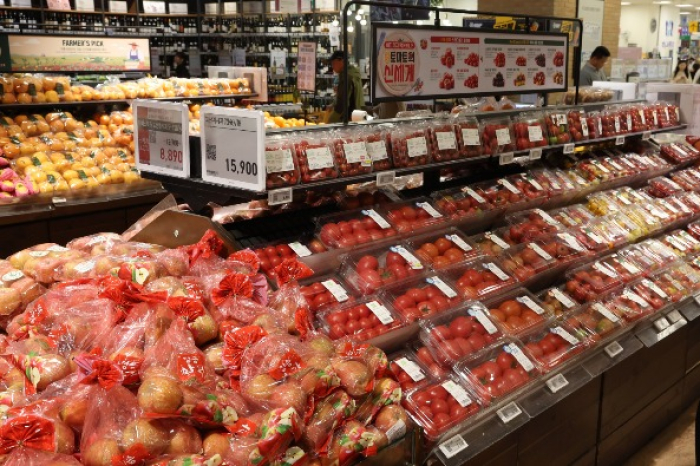Korea’s headline inflation dips below 3% in April but erratic
Upward pressure on the country’s inflation lingers, but core inflation’s downward trend remains intact
By May 02, 2024 (Gmt+09:00)
Samsung steps up AR race with advanced microdisplay for smart glasses


When in S. Korea, it’s a ritual: Foreigners make stops at CU, GS25, 7-Eleven


Maybe Happy Ending: A robot love story that rewrote Broadway playbook


NPS yet to schedule external manager selection; PE firms’ fundraising woes deepen


US auto parts tariffs take effect; Korea avoids heavy hit



South Korea’s headline inflation dipped below 3% for the first time in three months last month but uncertainty lingers from still-high agricultural product prices and unsteady international oil prices, which will likely keep the country’s policy rates at the current level for a while.
Consumer prices in April added 2.9% from the same month the year earlier, down 0.2 percentage point from March, according to data released by Statistics Korea on Thursday.
The retreat comes after Asia’s No. 4 economy’s headline inflation bounced back above 3% in February and March from the 2% level in January.
Livestock and fishery product prices gained less than 0.5% on-year last month but agricultural product prices jumped 20.3%, contributing 0.76 percentage point to the country’s overall inflation.
Petroleum product prices continued rising for the second month straight in April with a 1.3% gain, but their contribution to the overall consumer prices was limited to 0.05%.
“Despite high geopolitical risk in the Middle East, the rise in oil prices was somewhat limited. But we need to keep an eye on petroleum product prices for a while,” Gong Mi-sook, a director of social statistics at Statistics Korea, said on Thursday.
CHOPPY MOVES DELAY RATE CUTS
The country’s headline inflation has been adrift in recent months but its core inflation remains on the steady downward trend over the same period.
South Korea’s consumer inflation
Unit: %, year-on-year
(Graphics by Sunny Park)
Source: Statistics Korea
Core inflation, which excludes oil and agricultural prices, increased 2.2% on-year in April, down 0.2 percentage point from the previous month and trending down toward the Bank of Korea’s 2% inflation target.
Core inflation less food and energy prices tracked by the Organization for Economic Co-operation and Development (OECD) added 2.3%, down 0.1 percentage point over the same period.
The Bank of Korea, however, is expected to put off rate cuts in the country’s policy rates from the current level of 3.5% for a while amid continuing uncertainties about the global and domestic economy, as well as spikes in agricultural prices.
The central bank expected upward pressures on headline inflation to ease, eventually following core inflation’s trend, according to minutes of the BOK’s monetary policy meeting held on April 12, 2024.
But it also projected bumpy moves ahead due to agricultural product and oil prices.
Overnight, the Federal Reserve also kept the US benchmark lending rate at a 23-year high of between 5.25% and 5.5%, hinting that it will likely keep the rates at the current level for longer than expected while refraining from raising them again, according to Fed Chair Jerome Powell.

FRESH FOOD PRICES STAY HIGH
Fresh food prices dropped 3.7% on-month last month but jumped 19.1% on-year, showing volatile moves.
Fresh vegetable prices climbed 12.9%, while apple and pear prices skyrocketed 80.8% and 102.9%, respectively.
It was the biggest-ever gain in pear prices since Korea started compiling related price data in January 1975.
Apple and pear prices soared due to a supply shortage caused by last year’s extreme weather conditions, and their prices are expected to remain high until their new harvests, according to Statistics Korea.
Write to Se-Min Huh at semin@hankyung.com
Sookyung Seo edited this article.
-
 Shipping & ShipbuildingHanwha Ocean shares sink after KDB's sale of 4.2% stake
Shipping & ShipbuildingHanwha Ocean shares sink after KDB's sale of 4.2% stakeApr 29, 2025 (Gmt+09:00)
-
 EnergySouth Korea nears Czech nuclear deal; Doosan, related stocks fly high
EnergySouth Korea nears Czech nuclear deal; Doosan, related stocks fly highApr 25, 2025 (Gmt+09:00)
-

-
 Business & PoliticsSeoul, Washington agree on July tariff deal framework in '2+2' trade talks
Business & PoliticsSeoul, Washington agree on July tariff deal framework in '2+2' trade talksApr 25, 2025 (Gmt+09:00)
-



